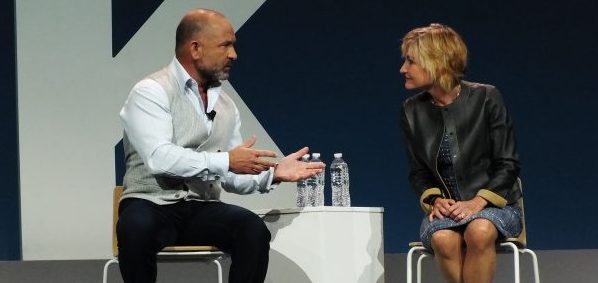LAS VEGAS – Canadian companies couldn’t stay out of the spotlight this week as IBM touted its various AI, cloud and blockchain platforms at Think 2018.
The week-long event is combining IBM’s two separate business and technology events – InterConnect and Amplify – for the first time, and the main stage was graced by Canadian partners throughout Tuesday and Wednesday’s keynotes. Ginni Rometty, IBM chairman, president and CEO, capped her morning address Tuesday by sharing the stage with Dave McKay, president and CEO of the Royal Bank of Canada.
“This client has made a big bet on digital, and it’s paying off,” she told the crowded Mandalay Events Center, adding RBC is spending $3 billion in 2018 on new technologies.
“[McKay’s] a computer programmer. This man is the right man to talk about data,” she said.

RBC, which is approaching its 150th anniversary next year, is rapidly advancing its AI capabilities with the help of IBM Watson and IBM Cloud, said McKay, leading to more efficient experimentation that allows the bank to get new services to market much faster. RBC has 60 apps living on IBM Cloud, and more recently, it launched Nomi Insights, an AI assistant that helps customers manage their money.
Since launching last August, McKay said more than 3 million customers have been using Nomi.
All these advancements were necessary when the rise of smartphones paved the way for customers to broadcast their intent to the world before visiting the bank, explained McKay. Partnering with IBM on these initiatives has also ensured their products are safe and secure, he added.
“If we’re moving money and it fails and doesn’t get there that’s not a good thing,” he said.
Below, you can listen to our podcast featuring Bruce Ross, who was also the private sector Canadian CIO of the Year for 2017.
Sonnet and the hybrid cloud
With the help of IBM Cloud, it took only six months for Sonnet Insurance Company to go from inception, to market, according to Alice Keung, senior vice president and chief information officer (CIO), Economical Insurance.
It was a huge success story for Economical Insurance when Sonnet launched in 2016 – Sonnet is Economical’s digital business that focuses on customers who want to buy insurance online – but it’s even more important to understand that disruption is not a one-time occurance, explained Keung, who spoke during the “Put Your Data to Work on the Cloud for Smarter Business” keynote Tuesday.

That’s why Economical is rolling out its Vyne suite – which launched last month – for brokers later this year. It’s a new way for brokers to do business with Economical, and will allow them to draw up a policy within minutes. Keung didn’t specify when exactly Vyne will be available, but did confirm they will be moving a large part of our business, including the commercial small market, property and auto, onto a new policy admin system.
“This system will be built upon the cloud infrastructure that we have deployed for Sonnet,” she said, referring specifically to the hybrid cloud infrastructure. “Cloud is essential to the success of Economical’s business strategy.
Plastic Bank wants to ‘influence poverty and the planet’
Wednesday morning’s keynote dedicated to blockchain featured The Plastic Bank, a Canadian-founded company that wants to use blockchain to reduce plastic waste.
It’s a radical idea, said Bridget van Kralingen, SVP, industry platforms for IBM, during a one-on-one with Plastic Bank’s founder and CEO David Katz this morning.
Katz agreed, and said it was daunting to think about following through this idea when he came up with it in 2013.
“When I had the idea, it was overwhelming … as an entrepreneur from Vancouver I had some entrepreneurial experience but to come up with an idea that would influence poverty and the planet and every living organism was a challenge,” he said.
But as the years went by, his idea gained more and more support and eventually, the company found a partner in IBM who helped them take their vision to another level with blockchain.

Plastic Bank is powered by IBM blockchain on LinuxONE, and allows people to collect plastic waste and trade it for money, items or other services. It also lets entrepreneurs to set up and run a convenience store for the poor, according to its website, in which plastic waste is the currency.
“There’s an immense need for authenticity amongst the poor,” said Katz. “And our customers, some of the biggest in the world, they use plastic as an input and also want to have that authenticity for their supply chain. And when they make an investment with us they want to ensure that the plastic is having an impact and coming from the areas we commit to. Blockchain provides that authenticity.”
Stay tuned for more coverage from IBM Think 2018, including a one-on-one interview with Katz.
An earlier version of this story noted more than 13 million customers had been using Nomi since last August. The correct figure is 3 million.
